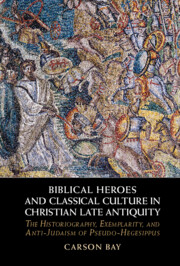 Biblical Heroes and Classical Culture in Christian Late Antiquity
Biblical Heroes and Classical Culture in Christian Late Antiquity Published online by Cambridge University Press: 10 November 2022
Chapter 3 explores how Pseudo-Hegesippus uses the figure of the patriarch Abraham, along with several other biblical heroes, to drive a variegated discourse of Jewish ethnography throughout De Excidio. By zeroing in on two passages where Abraham and other Bible figures are used to talk about “what the Jews are like” (i.e., ethnic stereotyping), Pseudo-Hegesippus shows himself familiar with ancient ethnographic conventions and uses ethnography to present various pictures of the Jewish national character in the mouths of both Roman and Jewish narrative characters.
To save this book to your Kindle, first ensure no-reply@cambridge.org is added to your Approved Personal Document E-mail List under your Personal Document Settings on the Manage Your Content and Devices page of your Amazon account. Then enter the ‘name’ part of your Kindle email address below. Find out more about saving to your Kindle.
Note you can select to save to either the @free.kindle.com or @kindle.com variations. ‘@free.kindle.com’ emails are free but can only be saved to your device when it is connected to wi-fi. ‘@kindle.com’ emails can be delivered even when you are not connected to wi-fi, but note that service fees apply.
Find out more about the Kindle Personal Document Service.
To save content items to your account, please confirm that you agree to abide by our usage policies. If this is the first time you use this feature, you will be asked to authorise Cambridge Core to connect with your account. Find out more about saving content to Dropbox.
To save content items to your account, please confirm that you agree to abide by our usage policies. If this is the first time you use this feature, you will be asked to authorise Cambridge Core to connect with your account. Find out more about saving content to Google Drive.